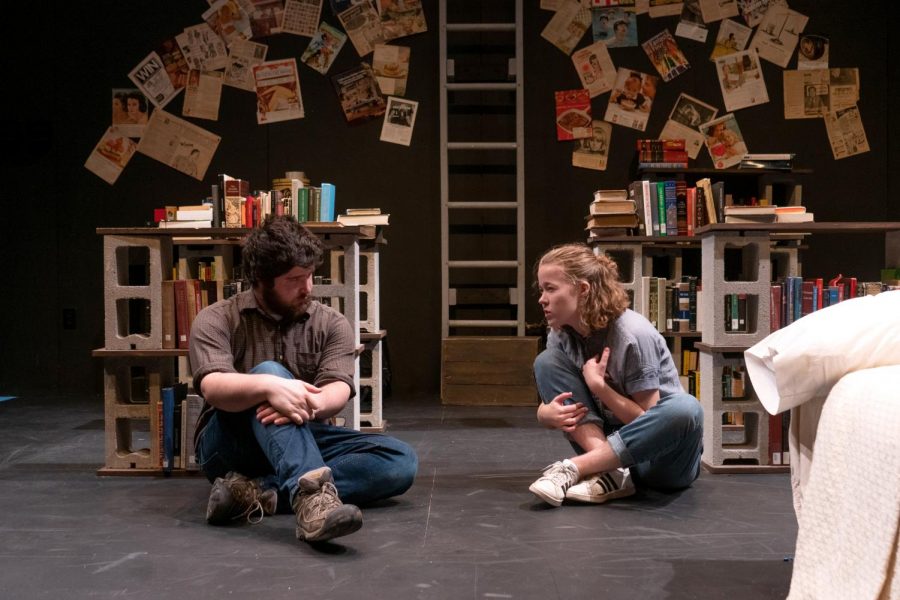Dystopian Play “The Size of a Fist” Explores the End of the World
College third-year James Dryden and College second-year Sophie Falvey performing in The Size of a Fist.
In the dark of Kander Theater, Bee, an adolescent girl, sits on the floor, trying to draw a tree. Behind her, a ladder in the back of the room stretches from floor to ceiling, making the audience feel as if they too are underground. Bee’s father peers at his daughter’s drawing, perplexed and disappointed by its inaccuracies. Bee explains she’s never seen real trees to reference.
Deep in a small ’50s bunker, designed to weather nuclear fallout, the two characters in The Size of a Fist live in a futuristic dystopian reality ravaged by climate change. The ever-inquisitive Bee has grown up with only books to teach her about the natural world, which she calls the “Above.”
“Growing up, I was a huge fan of science fiction and particularly dystopia,” said College fourth-year Delaney Kelly, who wrote and directed the play. “Since [climate change] looms so heavily on my generation, I think it’s incredibly timely and relevant to combine that with my interest in dystopia as a narrative.”
It’s easy to see the environmentalist themes in the show. Papa and Bee long to be back in the “Above,” and they savor each of the moments that connect them to nature. Bee sometimes stands in the shower, pretending that it’s rain, while Papa, who lived his adulthood above ground, tells Bee stories about gardens before she goes to bed each night.
College second-year and Stage Manager Katie Homer-Drummond explained that, when it was clear the world would become unlivable, Papa struggled to feel stable and hopeful in the midst of crisis. Bee, as part of a generation that may never live above ground, struggles to feel hopeful about the future at all. As Bee gets older, the two fight about her desire to go outside.
“Bee is really all that Papa has in his life,” said College third-year James Dryden, who plays Papa. “[The] purpose of his life at this point is really keeping her safe. And so they’re somewhat at odds in that sense. This gets brought up a lot of times [when] Bee really wants to go outside and learn about the world and from his point [of view] it’s too dangerous out there.”
College second-year Sophie Falvey, who plays Bee, explained her character’s motivations in the show.
“She spent her whole entire life in this sort of bunker with their limited knowledge of the outside world,” Falvey explained. “There’s real kind of urgency and I think growing frustration and growing kind of anxiety about not being able to get out.”
In addition to these two generations, the play references the generation before Papa, who Kelly sees as a part of her own generation.
“While never seen, [Bee’s grandfather’s] perspective is often referenced by Papa,” Kelly wrote in an email to the Review. “[The grandfather] would have taken for granted the beauty and stability that nature provides, while also witnessing the irreversible effects of climate change taking shape. Papa would have instead taken for granted the man-made effects on the environment. In this play, it’s very crucial that climate change is not shown to have happened all at once. Climate change is interpreted by each subsequent generation that inherits the aftermath.”
The play opens with a classic 1962 song, Skeeter Davis’ “The End of the World,” in which a woman croons, “Don’t they know it’s the end of the world?” Witnessing the fate of Papa and Bee, the audience is forced to question just how soon that end is coming and what can be done to help future generations.
However, the play doesn’t have a pessimistic tone. The cast and production team stressed that they want the audience to leave feeling inspired and capable to change the world around them, not defeated.
“We live in a time of change and that can be terrifying. It’s important to acknowledge that and not try and suppress it or hide how you feel about that and to genuinely and openly speak about it and work through those feelings,” Homer-Drummond said.
Kelly hopes the audience leaves the theater envisioning a positive future.
“I want audience members to question what sustains them,” said Kelly. “What do they want to grow? What do they want to cultivate?”
The Size of a Fist runs from Thursday, Nov. 21 to Sunday, Nov. 24 in Kander Theater. Tickets are free, and the show is open to the public.










